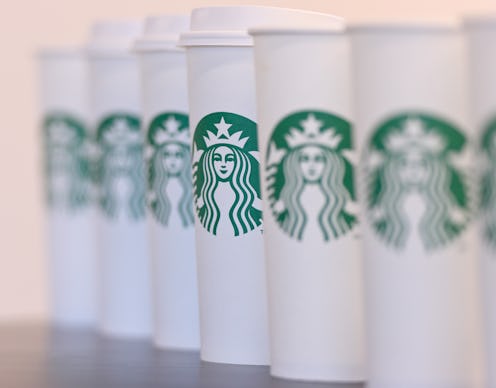Life
Starbucks’ Next Sustainable Cup Might Have One Of These Designs

That paper to-go cup for your favorite hot beverage isn’t quite as eco-friendly as you might think. That’s why Starbucks and other leaders in the food and beverage industry partnered to fund the NextGen Cup Challenge calling on innovators to create a more sustainable paper cup, and Starbucks had announced the first 12 winners of the challenge. A representative for Starbucks tells Bustle that potentially more than one of these designs may be implemented in the future across the NextGen Consortium, which include brands like Starbucks, McDonald's, Wendy's, and more. This is just the first stage of a three-year effort to help get these innovative solutions onto shelves and to identify ways to make it easier for consumers to recycle, Starbucks said in a news release.
An estimated 60 million paper cups end up in U.S. landfills each year because they can’t be recycled all that easily, CNN reports. Even though the outside of those paper cups is made of cardboard, says CNN, the inside is coated with a thin layer of plastic to keep your drink warm and to prevent that cardboard from getting soggy. It’s that layer of plastic that makes paper cups non-recyclable in most places, according to CNN, and it takes about 20 years for them to decompose.
Starbucks and fellow food chain McDonald’s distribute a combined four percent of the world’s 600 billion paper cups every year, according to Fortune. So, in 2018, Starbucks and McDonald’s teamed up to create a fully recyclable and/or compostable cup in three years through the NextGen Challenge in partnership with NextGen Consortium, Fortune reports. The partnership now includes The Coca-Cola Company, Yum! Brands, Nestlé, and Wendy’s, according to the news release.
Nearly 500 teams from around the world stepped up to the NextGen Challenge, and the Challenge received nearly 500 submissions from more than 50 countries, according to the news release. After a four-month review process, 12 winners have been announced in three categories: innovative cup liners, new materials, and reusable cup service models, the news release said.
“The level of interest we saw in the Challenge demonstrates a real appetite for long-lasting sustainable packaging solutions,” Kate Daly, executive director of the Center for the Circular Economy at Closed Loop Partners, said in a news release.
Each of the 12 winners will be awarded a portion of up to $1 million in funding to continue their work on their innovations, according to the news release. Up to six of the winners will receive extra support to prepare their innovations for real-world use through the NextGen Circular Business Accelerator, the news release said, including access to experts, business and technical resources, and testing and piloting opportunities for their paper cup innovations.
“This is a notable milestone to achieve our aspiration of sustainable coffee, served sustainably,” John Kelly, senior vice president of Global Public Affairs and Social Impact at Starbucks, said in a news release. “We’re a founding partner of the NextGen Consortium because we believe it will take the scale and influence of many global companies to make recyclable, compostable to-go cups an industry standard rather than the exception.”
Since the Challenge is still in its early stages, it’ll still be some time before you see any of these innovations at your local Starbucks or favorite food chain. Until then, Starbucks recommends taking advantage of their 10-cent discount when you bring a reusable cup to participating Starbucks stores if you want to avoid using paper cups altogether. If you don’t have one, Starbucks has reusable hot and cold cups for purchase in-store for just $2; they look almost identical to the iconic white paper Starbucks cup.
It’s pretty amazing to see these industry leaders band together to try to effect major change to protect the planet. I can’t wait to see what kind of solutions come out of this challenge in the coming years. Who knows; maybe Starbucks cups will look completely different — but be truly ecofriendly — in the future.